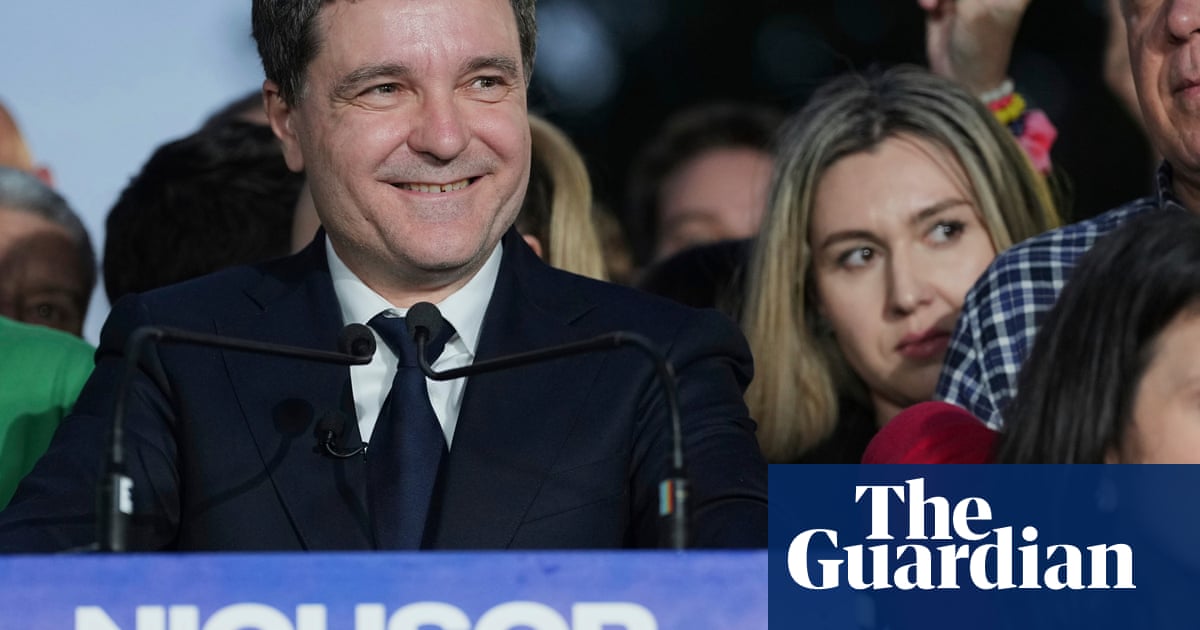The centrist mayor of Bucharest, Nicuşor Dan, is on track to win Romania’s pivotal presidential election with 85% of votes counted, according to official figures showing the pro-European independent six points clear of his far-right rival, George Simion.
The figures from Romania’s central election authority showed Dan, who had cast the second round vote as a battle between “a pro-western and an anti-western Romania”, on 53.2%, while George Simion, a self-described Trump admirer, had 46.8%.
The capital’s two-term mayor, who made his name fighting corrupt property developers, said voters seeking “profound change, functioning state institutions, less corruption, a prosperous economy and a society of dialogue, not hate, have won”.
Simion, however, disputed the polls. He said: “We are the clear winners of these elections. We claim victory in the name of the Romanian people.” Simion promised a parallel vote count would “ensure the identification of any potential fraud”.
Analysts have described the elections as the most important in the country’s post-communist history, with significant implications for the country’s strategic orientation and economic prospects as well as for European Union unity.
Simion won the 4 May first round, triggering thecollapse of Romania’s governmentof centre-left Social Democrats (PSD) and centre-right Liberals (PNL). The new president will nominate the next prime minister and influence the formation of a new coalition.
The former soccer ultra and ultranationalist agitator, who sees his far-right AUR party as a “natural ally” of the US Maga movement, scored almost double his rival’s total, but polls in recent days had shown the gap between the two narrowing.
Turnout, which totalled 53% in the first round, was almost 65%, with young people and Romanians living abroad voting in significantly higher numbers, official figures showed. Analysts have said a high turnout should favour Dan.
The Romanian foreign ministry said earlier on Sunday it had seen “a viral campaign of fake news on Telegram and other social media platforms” designed “to influence the electoral process”, adding that this bore “the hallmarks of Russian interference”.
The ministry’s social media post followed a post from the founder of the Telegram messaging app, Pavel Durov, which appeared to accuse the French government of asking the company to “silence conservative voices in Romania in the election”. France “categorically rejected” what it called “completely unfounded allegations”.
Russian-born Durov, who is now a French national, is being investigated in France over possession of child abuse image, drug trafficking and fraudulent transactions on the app.
Dan said Durov’s post, sent to all Telegram users in Romania while polls were still open, represented “unauthorised interference by a social media platform in the electoral process” and “a clear attempt to influence the outcome” of the vote.
The vote is a rerun of last November’s ballot, won by Călin Georgescu, a far-right, Moscow-friendly firebrand, who was barred from standing again after the vote was cancelled amid allegations of campaign finance violations and Russian meddling.
Sign up toThis is Europe
The most pressing stories and debates for Europeans – from identity to economics to the environment
after newsletter promotion
Simion has promised to nominate Georgescu, who is under formal investigation on counts including misreporting campaign spending, illegal use of digital technology and promoting fascist groups, as prime minister if he becomes president.
He said on Sunday he would keep that promise, adding: “This is not my victory, but that of the Romanian people, humiliated, robbed and lied to so many times before. It is the victory of a man who should have been president: Călin Georgescu.”
Romanian presidents have a semi-executive role, with considerable powers over foreign policy, national security, defence spending and judicial appointments, and can also dissolve parliament if MPs reject two prime ministerial nominations.
Analysts have said that since neither PSD or PNL would want a snap election with Simion’s AUR – the second biggest party in parliament – in the ascendant, a minority AUR-led government, backed perhaps by PSD, is a clear possibility if Simion wins.
Simion opposes further aid to Ukraine and has sharply criticised the EU’s leadership. While he insists he wants Romania to stay in the EU and Nato, he could ally with Hungary’s Viktor Orbán and Slovakia’s Robert Fico as another disruptive force.
The prospect of a Simion win has spooked markets and investors, causing the Romanian leu to plunge. Foreign business chambers in Romania, which has the EU’s highest budget deficit, warned of a “rapid deterioration” in the business climate.
